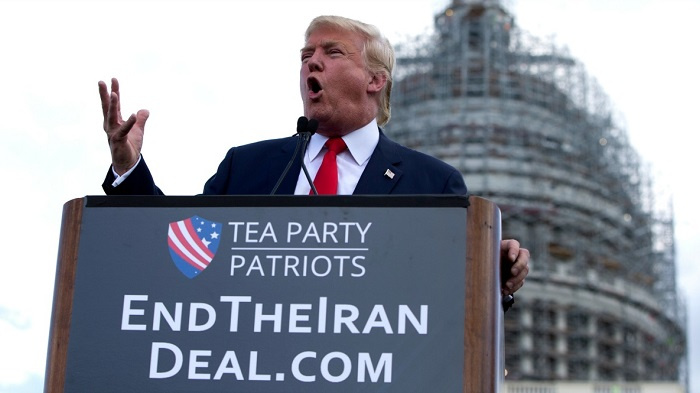Trump and Iran, the Road Ahead

By: Kaveh Afrasiabi
The surprise election of Donald Trump as the next US president has instantly raised new questions, as well as concerns, about the future of US-Iran relations. Will Trump act on his campaign promise of tearing the Iran nuclear deal, or will he limit himself to "revising" it? Will Trump adopt a more militarist line against Iran in the Persian Gulf, or a more accommodationist one that recognizes Iran's stabilizing role? Will Trump continue or change US' interventionist policy in Syria?
The answer to these questions can be partially deduced from past Trump's positions, the make-up of his foreign policy team, and the interplay of domestic and foreign factors that determine the US’ foreign policy in the proximate future. It is therefore important to avoid jumping to premature conclusions and or simplistic assumptions that overlook the distinctions between campaign rhetoric and actual policy. Certainly, from Iran's vantage, it is wrong to adopt a hostile approach toward Trump from the beginning, in light of his more realistic Syrian policy and anti-terrorism stance which feature important zones of agreement with Iran.
The problem, however, is that Trump is at the nodal point of contrary influences with respect to Iran and the Middle East, e.g., one of his biggest campaign contributors is Sheldon Adelson, known for his 'nuke Iran' rants. Trump's foreign policy advisers, including former New York mayor Rudi Giuliani, favor tougher actions against Iran, and chances are that the Iranophobic John Bolton will also receive a top foreign policy position in the new Trump administration. Other names floated publicly as potential candidates for Trump's foreign policy team include senators Jeff Session and Bob Corker, as well as former Speaker of the House Newt Gingrich, all considered hawks on Iran.
But, simultaneously Trump himself has evinced a bifurcated approach toward Iran that reflects a built-in dichotomy and incoherence. Thus, whereas on the one hand Trump has repeatedly demonized Iran as a "state sponsoring terrorism," on the other hand he has publicly acknowledged Iran's role against ISIS (Daesh), particularly in his third presidential debate, which in turn raises the question of whether or not Trump is willing to entertain entering into a security dialogue with Iran?
For sure, Trump's victory is viewed by Russia as a positive development that can lead to a de-escalation of tensions between US and Russia. Syria will be a litmus test and, again, much depends on Trump's ability to steer clear of third party influences in order to devise a sound policy on Syria, a country where the US military has already carved out a small though increasingly significant zone of influence that in all likelihood will not easily forfeit. The geopolitical factors involving Syria are quite complex and it may be some time before Trump can alter the equations there. Any improvement of US-Russia relations does not necessarily bode well for Iran, recalling the past history particularly with respect to the nuclear issue. Trump may in fact succeed in creating a wedge between Tehran and Moscow, all the more reason for Iran to carefully devise a sound strategy with respect to the changing guards at the White House.
Lest we forget, recently 50 top Republican national security advisers wrote a scatting letter that warned of Trump's "reckless" foreign policy. Trump has publicly threatened to take military action against Iran in the Persian Gulf and this is a clear example of recklessness that as the potential to ignite more tensions in the Middle East.
On the other hand, as his post-victory speech revealed, Trump's main concern is the domestic economy and responding to the needs of millions of working Americans who have heeded his populist call. This may act as a brake on Trump's tendency to engage in foreign policy adventures, which would raise the tab on the tax payers. Constructive engagement with Iran, a key regional player in volatile Middle East, is Trump's best option, in light of the shared threat of terrorism, Afghanistan's and Iraq's instability, etc. In turn, this requires a sound solution for the policy bifurcation on Iran mentioned above, that can be easily aggravated beyond repair should Trump opt for rescinding the nuclear deal unilaterally, which will compound his foreign policy problems, and or tougher sanctions on Iran.
With respect to the nuclear deal, if Trump does not step back from his campaign rhetoric, then the nuclear deal will be seriously jeopardized, which will not be in US’ own interests and will create a huge policy gap between US and Europe. US will then fail to recreate the past Iran sanctions bloc and will have to go it alone, bound to create substantial new headaches for Washington. Having boxed himself in the anti-nuclear deal, Trump will be forced to take some action, but the limits of his actions may have been already set by the UN's endorsement of the nuclear deal and the international backing that it enjoys today. Caught between a rock and a hard place, Trump will risk not only policy incoherence but a major foreign policy setback if he does not shrink from his campaign promises to trash the nuclear deal -- that has resulted in some business openings with Iran, recalling how at one point last year Trump questioned the Airbus deal and openly asked why Boeing could not benefit. This is a question worth pondering by the now president-elect Trump, given the fact that Iran's deal with Boeing is in the final stages of completion. How Trump acts on Obama's executive orders allowing these economic transactions with Iran will, indeed, disclose much about the course of Trump's Iran policy.
In conclusion, Trump's new foreign policy-in-making will feature several points of coincidences of interests as well as clashing interests with Iran, and which side will have the upper hands will be answered by history.
* The views expressed in this article are the author's own and do not necessarily reflect Iranian Diplomacy's editorial policy.

